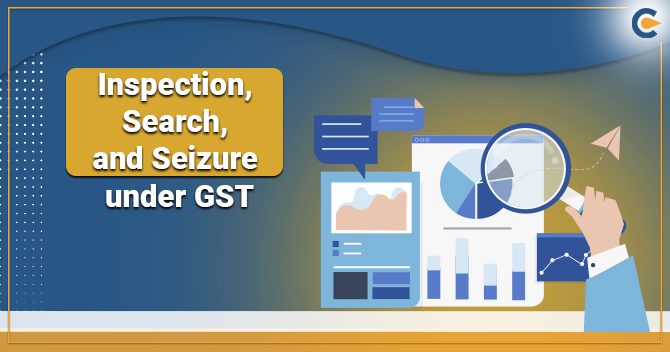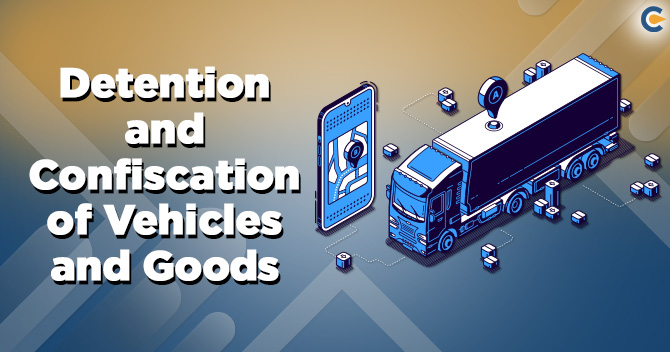The GST regime was enforced and accounted to make the taxation, uniformly implemented and more simplified than ever. Thus the government of India has made rules and regulations to stop and ensure tax evasion at least.
The concerned GST officers and Goods and services tax inspectors possess enough power and authorized to carry out any raids, search operations, and other necessary measures to prevent tax evasion frauds and other misconducts.
What is ‘Search’ under the Regime of GST?
In accordance with previous existing precedents and prevailing laws, the term “search” refers to an action of a government official or subordinates to visit the premises and investigate a related place with due care and attention on likewise a place, area, individual, organization, object, etc. to inspect or find out any concealed information, or for the purpose of searching of any evidence or proofs related to any existing or fore-going crime etc. The searching of a person, vehicle, or any premises can be possible only by any of the appropriate authority of law with a written order.
What is “Inspection” under the Regime of GST?
The term “Inspection” is firmly introduced with a new idea of a provision under the codified law of the CGST / SGST Act
- It is a weapon that softly and wisely used by the concerned authorities to ensure and decode the taxable person to reach its any business place.
- A person who engaged in the transportation of goods and services to any business place or the operator of a warehouse so as to inspect their business working thoroughly and dig out the concealed truth / factors on any case, if the authority deems fit so.
Read our article:Step by step guide on how to check GST Registration Status
Who has Authority to Grant Order for “Inspection” and under What Circumstances?
As per the section 67 of CGST Act, an officer of rank of joint commissioner or above shall grant its subordinates officials to inspect any place, premises etc on any circumstance if he has reason to believe and noted, that the concerned person has met with one of the below-mentioned conditions;-
- Suppressed any transaction of supply;
- Suppressed the stock of goods in hand;
- Claimed for excess ITC;
- Violated any provision of the CGST/SGST Act to avoid tax;
- A transporter or warehouse owner has kept those goods which have escaped payment of tax or kept their accounts or goods in a manner which is likely to lead to tax evasion.
Who has Authority to Grant Order for Search and Seizure under the provisions of CGST Act?
An officer who holds the position of Joint Commissioner or above can grant order an officer in writing to carry out search and seize goods, documents, books or things. Such order can be given only on the reasons to believe by the appropriate authority that any goods or any documents or books or things liable to confiscation or may be relevant for any proceedings, are could be hidden in anyplace.
What is the Meaning of Term “Search Warrant” and What it Contains?
The written authorised letter or document that allows or initiate to search is formally known as search warrant. The authority to grant search warrant is an officer who holds the position of Joint Commissioner or above. A search warrant must possess and inhibits the existence of a reasonable belief to cause a ‘search’.
The Search Warrant should contain details as shown given below:-


Procedure for Seizure
Section 67 (10) of CGST / SGST Act states that search should be done as per the provisions of Criminal Procedure Code, 1973. The officer will give an order of seizure in FORM GST INS-02. The basic provisions as to search and seizure are laid down in Section 100 of CrPC.
Powers of the Officer Authorized to “Search”
- The officer authorized to search shall possess the power to seal the door of the premises.
- The Concerned officers can open the doors of any premises if denied access.
- Officers are authorised to break any cupboard or box in which there is a possibility of hiding any items, books, documents etc.
Condition when it is Not Possible to Seize the Goods
In case it is not possible for the officer to seize the goods or somehow it became difficult in doing so, in such circumstances, the concerned officer shall debar and direct the owner of the said goods not to use, shift, or remove such goods without any prior permission or information of the officer. The officer shall issue an order of prohibition in FORM GST INS-03.
What is meant by ‘Reasons to Believe’?
Although ‘reason to believe’ means knowledge of facts (though it does not mean direct knowledge), which would make any prudent person, knowing similar facts, to conclude exactly the same thing.
According to the IPC, 1860, “a person is called a ’cause’ to believe something if he has reason enough to believe that thing but not otherwise.”
Reason to believe is a determination based on intelligent examination and evaluation. It differs from purely subjective thought, namely, an opinion. It is based on facts rather than interpretation.
Is it Mandatory to Record the ‘Reasons to Believe’ in Writing, before granting order for Inspection/ Search/ Seizure?
The GST Act does not mention recording of reasons to believe. In fact, Section 132 (1) and (1A) of the Income Tax Act has been amended in the Finance Act 2017, there is reason to believe that no person or any authority or appellate tribunal shall be disclosed.
What happens after Seizure?
- The person, whose documents have been seized, can make copies only in the presence of an officer.
- If the notice is not issued within six months of seizing the goods (extendable up to 6 months), they will be returned.
- The government can issue a list of dangerous or perishable goods that can be disposed of after being seized.
- All items seized will be properly listed by the officer.
The commissioner or an authorized officer may purchase any goods and / or services from a taxable person. This will be done to examine the issue of tax invoices, whether they are properly maintained, or the GST amount is clearly displayed. When the goods are returned, the amount has to be returned by the taxable person and the sales invoice has to be cancelled.
Concluding Remarks
The GST Act is generally enacted and enforced to take measures against the tax invaders and has a lesser quantity of loss to the government in the field of tax. Although, various traders are trying to escape from their duty to pay taxes to the government[1] and tries to tax evasion.
The government came up with a uniform and simplified aim to stop such things. And the act itself empowers the concerned authority to search, inspect, and act accordingly the codified laws if there is an existence of any tax evasion.
Though the concerned department authorized and liable to set up and detect those loopholes which directly affect the machinery of government and bound to eliminate them with due care under specified law. Kindly associate with the Corpbiz expert to know more about the power of inspection, search, and seizure under the regime of GST.
Read our article:How to apply for GST registration certificate online?











